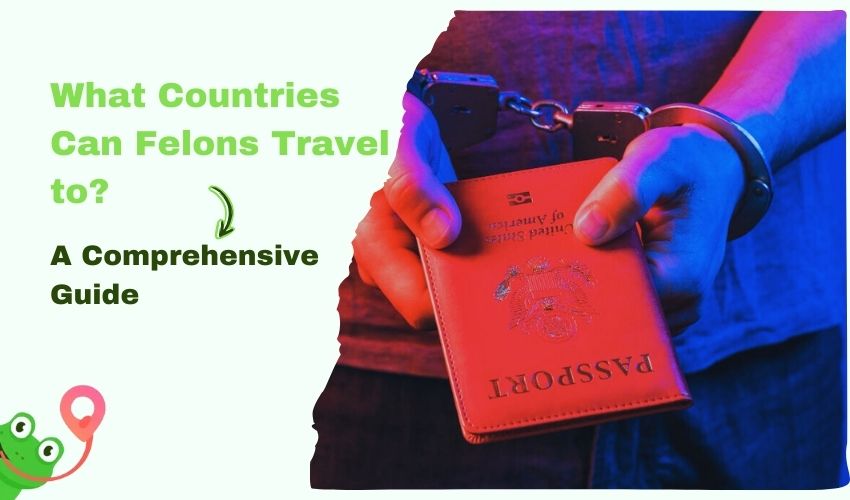What Countries Can Felons Travel to? A Comprehensive Guide

Traveling is a dream of many, including me, but it is not always as simple as it looks. People with criminal records often face extra challenges when crossing borders. If you are a felon and tried to move abroad but could not find a way, you have come to the right place. While many countries do not allow felons to enter, many first-world countries allow felons to cross their border.
Some countries have stricter rules, and some have less strict rules. Knowing these rules can save time and money.
Many felons search for queries like, can felons leave the country? And what countries can felons travel to? Well, the answer depends on multiple factors. Some travelers can travel freely, while some face heavy restrictions. Getting a passport is usually possible, but that does not guarantee entry to every country. Places like Canada, Australia, Japan, and Mexico have strict rules, while most Schengen countries are lenient towards felons.
This guide will highlight the latest facts and information on international travel for falcons. In addition to this, we will also help you find the answers to many common questions like whether can felons travel internationally and whether countries blacklisted felons.
Countries Felons Can and Cannot Travel To
| Country/Region | Entry Policy for Felons | Notes |
|---|---|---|
| Canada | Case-by-case, serious crimes may lead to denial | Options include applying for criminal rehabilitation or a Temporary Resident Permit (TRP) |
| Mexico | Minor offenses are often overlooked; entry not guaranteed | Character waivers are possible but not guaranteed |
| Japan | Strict: Felons with sentences over 5 years or recent 12-month sentences may be denied. | No rehabilitation programs; honesty on visa applications is crucial |
| New Zealand | Case-by-case, may face stricter scrutiny | Strict: Felons with sentences of 4 years or more or recent convictions may be denied. |
| United Kingdom | Character waivers are possible but not guaranteed | Spent convictions may not affect entry; honesty is essential |
| France | Generally lenient; no specific questions about criminal history on visa applications | Part of the Schengen Area; ETIAS authorization will be required starting mid-2025 |
| Ireland | Case-by-case; may face stricter scrutiny | Not part of the Schengen Area; independent entry requirements |
| Spain | Allows entry for minor offenses; serious crimes may lead to denial | Part of the Schengen Area; ETIAS authorization will be required starting mid-2025 |
| Czech Republic | Generally allows entry; minor offenses typically not an issue | Part of the Schengen Area; ETIAS authorization will be required starting mid-2025 |
| Italy | Allows entry for those who have completed their sentence and probation | Part of the Schengen Area; ETIAS authorization will be required starting mid-2025 |
| Germany | May deny entry for serious crimes like drug trafficking or human smuggling | Part of the Schengen Area; ETIAS authorization will be required starting mid-2025 |
| Iceland | Generally allows entry; minor offenses typically not an issue | Part of the Schengen Area; ETIAS authorization will be required starting mid-2025 |
| Poland | Allows entry for those without active felony warrants | Part of the Schengen Area; ETIAS authorization will be required starting mid-2025 |
| Netherlands | Allows entry for those without active felony warrants | Part of the Schengen Area; ETIAS authorization will be required starting mid-2025 |
| Austria | Generally allows entry; minor offenses typically not an issue | Part of the Schengen Area; ETIAS authorization will be required starting mid-2025 |
What is a Felon?
A felon is someone who has been convicted of a serious crime. In the U.S., felonies include offenses like:
- Robbery
- Drug Trafficking
- Fraud
- Sexual Crimes
- Violent Crimes
These crimes typically result in a prison term of more than one year. Some lesser crimes, called misdemeanors, have lighter punishments.
The term “felon” comes from English law. Over time, laws have changed, but felons still face severe consequences. In the U.S., felons also lose some significant rights, such as voting or owning firearms. However, felons can restore some of their rights later, depending on the type of crime and state laws. In addition, a felon faces an international travel ban from some countries.
What Countries Can Felons Travel to: Best Countries for Felons
Can felons travel internationally? Yes, felons can travel internationally without so many difficulties to Canada, Australia, Japan, and Mexico. Felons can still travel to several first-world countries if they meet specific requirements.
Most European countries of the Schengen region allow felons to enter and allow 90- to 180-day stays. However, it is important to note that the European Travel Information and Authorization System (ETIAS) is expected to be implemented in mid-2025. This new system will require travelers from visa-exempt countries to obtain authorization before entering Schengen countries. This system will include background checks, and having a criminal record may affect the approval of your ETIAS application.
Following are some of the best countries for felons.
- France
- Ireland
- Spain
- Czech Republic
- Italy
- Germany
- Iceland
- Poland
- Netherlands
- Austria
Can a Felon go to France?

Travelers with a felony conviction can enter France without a visa for short stays. When you apply for a visitor visa to France, no questions are asked related to criminal history and previous convictions. However, with the upcoming ETIAS system, travelers must obtain authorization before their trip.
Can a Felon go to Ireland?

Travelers with a criminal record may face stricter scrutiny in Ireland, but you can have a bright chance of entry. It is a beautiful destination with historic landmarks and old-style pubs.
Can a Felon go to Spain?

Spain permits travelers with felony convictions to visit for up to 90 days without a visa. The upcoming ETIAS authorization will be necessary for future travel. For now, you can visit the country. Entry to Spain depends on the type and duration of conviction you have faced before. If it is not a serious crime, you are most likely to get entry into Spain.
Can a Felon go to Czech Republic?

The Czech Republic allows visa-free, short-term travel. With the ETIAS system, travelers will need to apply for authorization before their visit. For now, felons can travel to the Czech Republic to enjoy the area’s romantic destinations. Prague in Czechia is considered one of the most romantic places in the world.
Can a Felon go to Italy?

Felons with a conviction can travel for a few days to Italy without a visa. If you have completed the sentence and probation period after that, you can easily travel to Italy. However, just like other Schengen region countries, Italy will also require the ETIAS authorization to enter the country.
Can a Felon go to Germany?

Germany allows visa-free travel for up to 90 days. However, people with a serious crime history, such as drug trafficking and human smuggling, can face a ban, even if they have completed the sentence period. Furthermore, after mid-2025, the forthcoming ETIAS system will require prior authorization.
Can a Felon go to Iceland?

Iceland permits short-term visa-free travel. Once implemented, ETIAS authorization will be needed. It’s essential to stay updated on the latest travel regulations and consult the Icelandic embassy or consulate before planning your visit.
Can a Felon go to Poland?

Poland allows travelers with felony convictions to visit without a visa for short stays. However, only people with current convictions or active felonies are allowed to visit. The ETIAS system will soon require travelers to obtain authorization before entry.
Can a Felon go to Netherlands?

The Netherlands is part of the Schengen Area and enables visa-free travel for up to 90 days. ETIAS authorization will soon be mandatory. For now, you can visit the Netherlands unless you are facing an active felony warrant.
Can a Felon go to Austria?

Austria permits short-term visa-free travel. The upcoming ETIAS system will require prior authorization for entry. The country has beautiful landscapes and architecture. Several festivals throughout the year make it worth visiting.
Countries That Blacklist Felons
We will look at countries that do not allow felons to enter. Some nations have strict rules and deny entry based on criminal records. Serious crimes like drug offenses, fraud, and violence lead to the most onerous restrictions. We will check the laws and regulations for each country.
1. Can Felons Visit Canada?

Canada has strict entry rules for individuals with criminal records. No matter the number of years, recent or old conviction. If you have a felony conviction, you are inadmissible and not allowed to enter the country. This applies even if the conviction occurred many years ago. The strictest actions are taken against the felons involved in crimes such as:
- Murder
- Drugs transport
- Theft
However, there are ways to overcome this inadmissibility. One option is to apply for criminal rehabilitation. This application does not mean that you will get a guaranteed visa. However, if it is approved, then your inadmissibility is permanently removed. Another option is to obtain a Temporary Resident Permit (TRP), only in extreme circumstances. It allows temporary entry into Canada. The decision to grant entry is made by Canadian immigration officers, who assess each case individually.
It is important to note that Canadian authorities can access U.S. criminal records. You can face a permanent ban if you attempt to enter Canada without declaring your criminal record.
Therefore, addressing any criminal inadmissibility issues is crucial before attempting to enter Canada. Depending on your specific circumstances, this may involve applying for rehabilitation or obtaining a TRP.
2. Can Felon Enter Mexico?

In another neighbor to the U.S., Felons also face restrictions to enter into Mexico. But this neighbor imposes fewer limits than Canada. The State Department of Mexico states that:
“Mexican law permits Mexican immigration authorities to deny foreigners entry into Mexico if they have been charged with or convicted of a serious crime in Mexico or elsewhere.”
Now, what does it mean by serious crimes? According to Article 194 in Mexican law, all those crimes that violate the public’s fundamental rights are considered serious crimes. Examples of serious crimes include:
- Murder/Manslaughter
- Terrorism
- Genocide
- Attempt/Prison break
- Attack on government properties
- Child Pornography
- Corruption
- Rape
- Drug trafficking/ minor trafficking
- Highway robbery/ vehicle theft
- Tax fraud
- Smuggling
According to these crimes, luckily, many felons with minor crimes do not come into the category of serious crimes in Mexico. So if you are wondering whether convicted felons can travel to Mexico, the answer is yes, but subject to the type of crime a felony has committed. I have personally met with many felons who traveled to Mexico and said that no one from the customs or border forces asked about their criminal activities or convictions.
3. Can Felons Enter Japan?

Japan has strict entry rules for travelers with a criminal record. The Immigration Control and Refugee Recognition Act of Japan states that some felons will not be admitted. Moving to Japan is quite difficult or maybe impossible compared to Canada and Mexico. They do not have rehabilitation programs, so past convictions remain a concern when applying for a visa.
Felons may be denied entry if:
- They were sentenced to one year or more in prison (Except for political offenses).
- They were convicted of drug-related crimes, including narcotics, stimulants, or psychotropic substances.
- They were involved in prostitution-related offenses or activities linked to it.
This means that not all felons are automatically banned. The main deciding factors are the sentence length and the type of crime. Minor offenses with short sentences may not cause issues. However, those with drug-related or violent convictions face stricter restrictions.
How Japan Enforces These Rules
Most visitors to Japan arrive by air, which gives immigration officers time to check their backgrounds. Japan does not have direct access to U.S. criminal records, but officials may request this information. If a felony is discovered during screening, entry may be denied.
Travelers applying for a visa must honestly answer questions about their criminal history. Lying on an application can lead to a permanent ban. Japan does not perform routine background checks on visa-free travelers. However, border officers can ask questions and deny entry if they suspect an issue.
4. Can Felons Travel to New Zealand?

New Zealand tops the list of the most challenging destinations for felonies.
The country has demanding character requirements. All travelers must declare their full criminal history, even if some convictions are considered “spent” in other countries. Immigration officials have the authority to refuse entry to anyone they believe poses a risk.
Felons cannot enter New Zealand if they:
- Sentenced to five or more years in prison.
- Received a 12-month or longer prison sentence within the last 10 years.
However, even if a felon does not fall under these categories, they can still be denied entry at the discretion of border officers. Officials can reject travelers they believe show criminal tendencies based on past convictions. This makes New Zealand one of the most unpredictable places for felons to visit.
Can Felons Apply for a Waiver?
New Zealand does offer a character waiver, but approval is not guaranteed. When applying for a visa, felons must submit a waiver request explaining why they should be allowed entry. Immigration officers consider factors like:
- The nature of the crime.
- How much time has passed since the offense?
- Any rehabilitation efforts.
Honesty is key when applying. Lying about past convictions can lead to permanent bans and legal consequences. Even those with minor offenses should consult New Zealand’s immigration department before traveling.
5. United Kingdom

The United Kingdom also has a similar visa policy for felons. If you are a felon, your entry to the UK depends on several factors.
- If you are convicted of four or more years in prison, such individuals, are most likely denied the visa.
- Convictions within the last 12 months or multiple convictions lead to visa rejection.
You can apply for the Visa Waiver Program. To be eligible for this program, you must enclose your criminal history. Authorities will assess your application and allow or reject your visa.
The UK has strict rules for travelers with a criminal record. It follows the spent conviction system. The conviction is spent if 10 years have passed since a sentence of 6 to 30 months. This means it no longer affects travel. Shorter sentences have a rehabilitation period of around 5 years. Sentences over 30 months are never spent. Border officers must prove a conviction is not spent to deny entry. Travelers do not need to mention spent convictions. But officials can still check records. It is best to review UK entry laws before planning a trip.
Can a Felon Get a Passport and Leave the United States
Felons can leave the United States after completing their sentence, which includes prison time, probation, or parole. However, some restrictions apply.
- Supervision Restrictions – Felons on parole or probation need approval. Their officer decides if they can travel.
- Unpaid Child Support – Those owing more than $2,500 in child support cannot get a passport.
- Court Orders – A court can ban a felon from leaving the country. This happens if they have an ongoing case.
- Drug Trafficking – Felons with drug trafficking charges face more travel restrictions.
Can a Felon Get a Passport?
Most felons can apply for a U.S. passport, and mostly they can get a passport. A passport is only a travel document. It does not guarantee entry to another country. Some felons cannot get a passport. These include:
- Those convicted of drug trafficking across borders.
- Felons with court orders stopping them from leaving.
- Individuals with unpaid child support over $2,500.
Each country has its own rules. Some allow felons to enter. Others do not.
Challenges Felons Face When Traveling
Traveling with a felony is not always easy. Many countries have strict entry rules for people with criminal records. Some felons can travel without issues, while others face significant restrictions. The severity of the crime plays an important role in determining travel rights.
Violent crimes, drug offenses, and fraud lead to the most onerous restrictions. Countries like Canada and Mexico often deny entry to felons with these convictions. Those convicted of minor crimes may have better chances of visiting different countries.
Can felons leave the country? In most cases, yes. The U.S. government allows felons to get passports unless they commit serious crimes like drug trafficking or international crimes. However, having a passport does not mean every country will allow entry.
Countries blacklisted felons based on their laws. Some check criminal records before granting a visa. Others deny entry at the airport if background checks reveal a past felony.
Proper planning is important. Some countries allow felons to enter if they apply for a special waiver or wait a few years after serving their sentence.
Visa Process for Felons
Getting a visa can be more difficult for felons. Most countries check background history and criminal records before approving a visa. Many countries ask for police clearance certificates or court documents. The type of crime and how much time has passed since the conviction affect the chances of approval.
Some countries, like France and Austria, allow entry with extra paperwork, while others have strict bans. Countries like Canada and Mexico often reject applications for serious offenses. However, others may enable felons to visit if they provide proof of rehabilitation.
Honesty is essential when applying. Do not add false information on the visa form. This could lead to a permanent ban on international travel. Some countries offer waivers for past crimes, but the process can take time.
Summary
What countries can felons travel to? Felons can travel internationally, but there are challenges. Some countries allow entry, while others have strict rules. Places like Canada, Japan, and New Zealand have strict restrictions. Others, like France and Spain, are more lenient.
Can a felon get a passport? Yes, getting a passport is possible for most felons. But those with unpaid child support, drug trafficking convictions, or travel bans may be denied. Some may also need special permission if they are on parole or probation.
Can felons travel internationally? Yes, but each country has its own rules. It’s essential to check the entry requirements before planning a trip. I have given a list of what countries felons can travel to. Some felons may need visas and special approvals.
Traveling with a felony is not impossible. But it requires research and preparation. Understanding the laws of different countries can help avoid problems at the border.
Frequently Asked Questions
Yes, most felons, including those on probation or parole, can leave the U.S. after completing their sentence. However, those with travel bans, pending cases, or unpaid child support over $2,500 may face restrictions.
Most felons can apply for a U.S. passport. However, criminals convicted of drug trafficking across borders or those with court-imposed travel bans may be denied. But most of the time, a felon can get a passport. Remember that a passport is only a travel document and does not ensure you can travel to any country.
Countries like France, Spain, Germany, and the Netherlands allow felons to enter without strict background checks. However, some nations, like Canada and Japan, have strict policies against travelers with criminal records.
Felons can travel to Mexico, but entry is not guaranteed. Mexican immigration officers may deny entry if a traveler has a serious criminal record, especially for drug-related or violent crimes.
Canada has strict rules for felons. Anyone with a felony conviction may be denied entry. However, felons can apply for criminal rehabilitation or a Temporary Resident Permit to enter legally.
Yes, felons can travel internationally if they have a valid passport and meet the entry requirements of the destination country. However, some countries may deny entry based on criminal history, especially for serious offenses.




